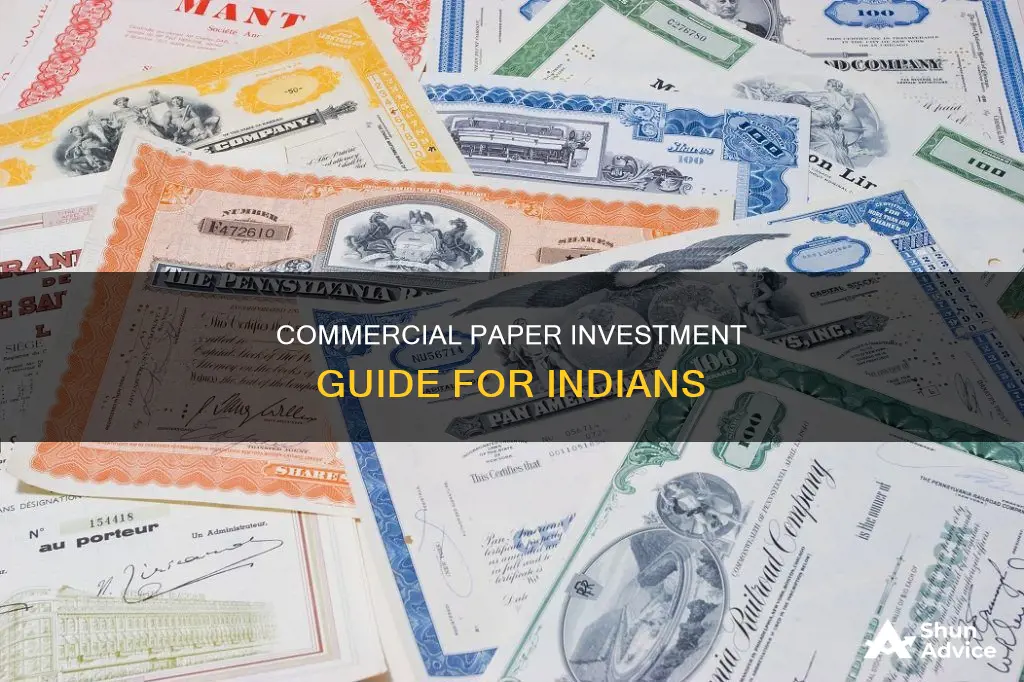
Commercial paper (CP) is a short-term debt instrument issued by companies to raise funds for a period of up to one year. In India, CPs are issued in denominations of Rs 5 lakh or multiples thereof and have a maturity period ranging from 7 days to 270 days. They are typically issued by large banks or corporations to cover short-term receivables and meet financial obligations such as payroll or funding for new projects. CPs are unsecured debt instruments, meaning they are not backed by collateral, and are therefore only issued by companies with high credit ratings. They are usually sold at a discount and offer higher interest rates than bonds. Individuals, banking companies, corporate bodies, non-resident Indians (NRIs), and foreign institutional investors (FIIs) can invest in CPs in India, although FII investments are subject to limits set by the Securities and Exchange Board of India (SEBI).
| Characteristics | Values |
|---|---|
| What is Commercial Paper? | A short-term debt instrument issued by companies to raise funds for a time period of up to one year. |
| Who can invest in Commercial Paper? | Individuals, banking companies, other corporate bodies (registered or incorporated in India), unincorporated bodies, non-resident Indians (NRIs), and foreign institutional investors (FIIs). |
| Minimum Investment | Rs 5 lakh or multiples thereof |
| Maturity | Minimum of 7 days and a maximum of up to one year from the date of issue. |
| Credit Rating Requirement | Minimum credit rating of A-2 as per Sebi guidelines. Issued by companies with high credit ratings from recognised agencies. |
| Interest Rates | Typically lower than banks' rates, with longer maturities leading to higher interest rates. |
| Advantages | Speed, flexibility, lower interest rates than other short-term borrowings, potential for credit enhancement. |
| Disadvantages | Credit risk, interest rate risk, liquidity risk, regulatory risk. |
What You'll Learn

Who can invest in commercial paper in India?
Commercial paper (CP) is a short-term debt instrument issued by companies to raise funds for a period of up to one year. In India, the following entities can invest in CPs:
- Individuals
- Banking companies
- Other corporate bodies (registered or incorporated in India)
- Unincorporated bodies
- Non-resident Indians (NRIs)
- Foreign institutional investors (FIIs)
However, there is a high barrier to entry for retail investors, as CPs are issued in denominations of Rs 5 lakh or multiples thereof. This means that an investment of at least Rs 5 lakh is required to purchase CPs. FII investments are also subject to limits set by the Securities and Exchange Board of India (SEBI).
Networking NYC: Investment Management Connections
You may want to see also

What are the requirements for companies issuing commercial paper?
To issue commercial paper (CP) in India, companies must fulfil several requirements. CP is a short-term, unsecured debt instrument that companies use to raise funds for a period of up to one year. Here are the key requirements for companies issuing CP in India:
- High Credit Rating: Companies must have a high credit rating from a recognised credit rating agency. The minimum credit rating requirement is A-2 as per Securities Exchange Board of India (SEBI) guidelines. CRISIL, ICRA, CARE, Fitch, and other credit rating agencies specified by the Reserve Bank of India (RBI) can provide this rating.
- Tangible Net Worth: The issuing company's tangible net worth should not be less than 4 Crores, according to the latest audited balance sheet.
- Sanctioned Working Capital Limit: The company must have a sanctioned working capital limit by banks or financial institutions.
- Standard Asset Classification: The financial institutions or banks should classify the borrowal account as a standard asset.
- Credit Rating for Issuance: Before issuing CP, companies must obtain a credit rating for the issuance from a SEBI-registered credit rating agency. The minimum credit rating to obtain CP is A3, as per SEBI's rating symbol and definition.
- Maturity Period: CP can be issued with a maturity period ranging from a minimum of 7 days to a maximum of one year from the date of issue. The maturity date should not go beyond the validity of the credit rating of the issuer.
- Denomination: The denomination for issuing CP must be Rs. 5 lakhs or its multiples.
- Current Credit Rating: Issuers must ensure that their credit rating is current and has not fallen due for review at the time of CP issuance.
By fulfilling these requirements, companies in India can issue CP to raise short-term funds from investors.
Portfolio Net Assets: A Concern for Investors?
You may want to see also

What are the advantages of commercial paper?
Commercial paper (CP) is a short-term debt instrument issued by companies to raise funds for a period of up to one year. Here are some advantages of investing in commercial paper in India:
Speed and Flexibility
Commercial paper can be issued quickly, making it a good option for companies that need to raise funds on short notice. It also provides flexibility in terms of the purpose of fund-raising, including working capital, inventory financing, and debt refinancing.
Lower Costs
Commercial paper tends to have lower interest rates and costs compared to other short-term borrowing options like bank loans. This can help companies improve their financial stability and creditworthiness, potentially enhancing their overall credit rating.
High Interest Rates
Commercial paper is usually sold at a discount from its face value and carries higher interest repayment rates than bonds. The longer the maturity period, the higher the interest rate the issuing company will pay.
Wide Range of Investors
In India, individuals, banking companies, corporate bodies, unincorporated bodies, non-resident Indians (NRIs), and foreign institutional investors (FIIs) can invest in commercial paper. This diverse range of investors allows companies to access a broader pool of capital.
Credit Enhancement
Commercial paper can help companies enhance their credit rating. By issuing commercial paper, companies can demonstrate their financial stability and creditworthiness to potential investors.
Investment Management SA: Strategies for Success
You may want to see also

What are the disadvantages of commercial paper?
Commercial paper (CP) is a short-term debt instrument issued by companies to raise funds for a period of up to one year. Here are some disadvantages of investing in commercial paper:
- Difficulty in Raising Capital: Commercial papers may only be used to raise funds by companies that are financially stable and have a good credit rating. As this approach is insecure, it is not suitable for new or moderately rated companies.
- Capital Restrictions: The amount of money that can be raised through commercial paper is limited.
- Maturity Period: Commercial paper is an impersonal type of financing, and if a company is unable to redeem its paper due to financial difficulties, extending the maturity of a CP is not feasible.
- Credit Risk: Being unsecured, CPs carry a higher risk of default compared to secured instruments.
- Market Dependence: The ability to issue CPs relies heavily on favourable market conditions and investor interest.
Investment Advisors: India's SEBI-Registered Professionals Count
You may want to see also

How do commercial paper yields work?
Commercial paper yields work in a similar way to treasury bills, in that they are quoted on a discount basis. The discount return to commercial paper holders is the annualised percentage difference between the price paid for the paper and the face value, using a 360-day year.
The formula for this is:
> {\displaystyle dy_{CP}= {\frac {P_{f}-P_{0}}{P_{f}}}\,{\frac {360}{t}}}
Where:
- {\displaystyle dy_{CP}} is the discount yield
- {\displaystyle P_{f}} is the face value
- {\displaystyle P_{0}} is the price paid
- {\displaystyle t} is the term length of the paper in days
When converted to a bond equivalent yield, the formula is:
> {\displaystyle bey_{CP}= {\frac {P_{f}-P_{0}}{P_{0}}}\,{\frac {365}{t}}}
Commercial paper is issued at a discount and matures at its face value. The discount is how interest is paid on commercial paper. The difference between the face value and the discounted price paid is the interest earned.
Commercial paper is an unsecured, short-term debt instrument issued by corporations. It is typically used to finance short-term liabilities such as payroll, accounts payable, and inventories. Commercial paper is usually issued by large corporations with strong credit ratings.
Commercial paper is a cost-effective and simple means of financing. It is also easier to deal with compared to the effort, time, and money involved in getting a business loan. It offers investors a low risk of default.
Target's Direct Investment Plans in India
You may want to see also
Frequently asked questions
Commercial paper (CP) is a short-term, unsecured promissory note issued by corporations to raise funds for a period of up to one year.
Individuals, banking companies, other corporate bodies (registered or incorporated in India), unincorporated bodies, non-resident Indians (NRIs), and foreign institutional investors (FIIs) can invest in CPs in India.
The minimum investment amount for commercial paper in India is Rs. 5 lakh (500,000 rupees).
As commercial paper is unsecured, there is a risk of default, and investors have very little recourse if the issuer cannot make payments. Commercial paper is also subject to interest rate risk, liquidity risk, and regulatory risk.







